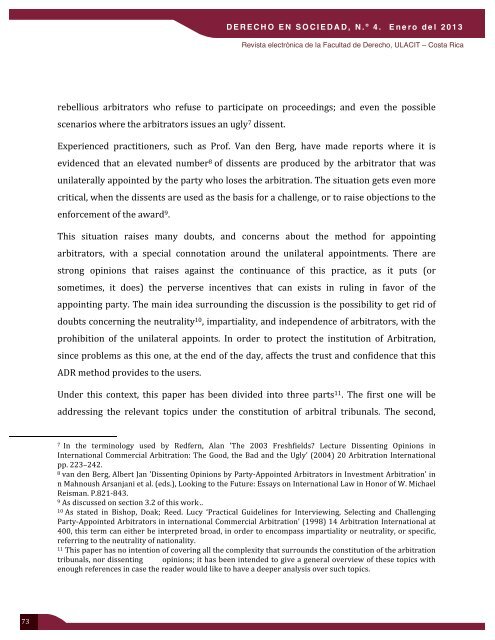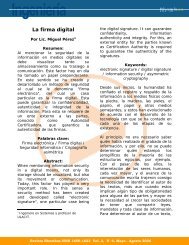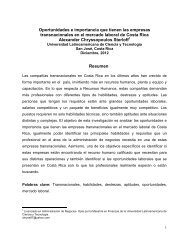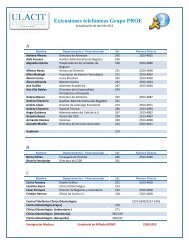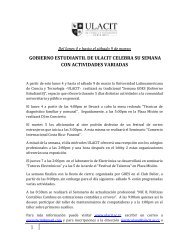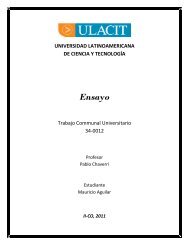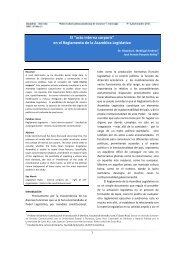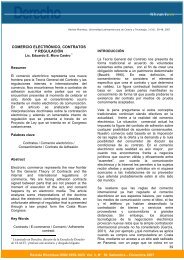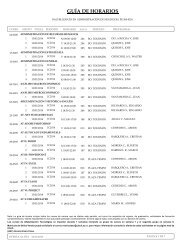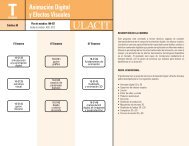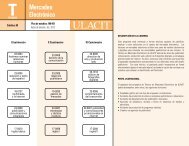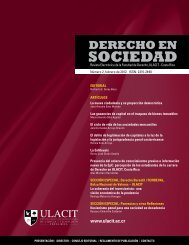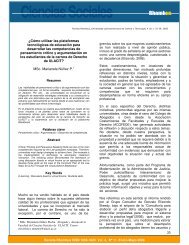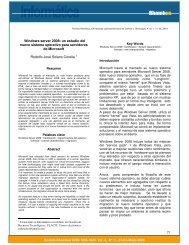IV Edición Revista Derecho en Sociedad - Ulacit
IV Edición Revista Derecho en Sociedad - Ulacit
IV Edición Revista Derecho en Sociedad - Ulacit
Create successful ePaper yourself
Turn your PDF publications into a flip-book with our unique Google optimized e-Paper software.
DERECHO EN SOCIEDAD, N. º 4 . Enero del 2013<br />
<strong>Revista</strong> electrónica de la Facultad de <strong>Derecho</strong>, ULACIT – Costa Rica<br />
rebellious arbitrators who refuse to participate on proceedings; and ev<strong>en</strong> the possible <br />
sc<strong>en</strong>arios where the arbitrators issues an ugly 7 diss<strong>en</strong>t. <br />
Experi<strong>en</strong>ced practitioners, such as Prof. Van d<strong>en</strong> Berg, have made reports where it is <br />
evid<strong>en</strong>ced that an elevated number 8 of diss<strong>en</strong>ts are produced by the arbitrator that was <br />
unilaterally appointed by the party who loses the arbitration. The situation gets ev<strong>en</strong> more <br />
critical, wh<strong>en</strong> the diss<strong>en</strong>ts are used as the basis for a chall<strong>en</strong>ge, or to raise objections to the <br />
<strong>en</strong>forcem<strong>en</strong>t of the award 9 . <br />
This situation raises many doubts, and concerns about the method for appointing <br />
arbitrators, with a special connotation around the unilateral appointm<strong>en</strong>ts. There are <br />
strong opinions that raises against the continuance of this practice, as it puts (or <br />
sometimes, it does) the perverse inc<strong>en</strong>tives that can exists in ruling in favor of the <br />
appointing party. The main idea surrounding the discussion is the possibility to get rid of <br />
doubts concerning the neutrality 10 , impartiality, and indep<strong>en</strong>d<strong>en</strong>ce of arbitrators, with the <br />
prohibition of the unilateral appoints. In order to protect the institution of Arbitration, <br />
since problems as this one, at the <strong>en</strong>d of the day, affects the trust and confid<strong>en</strong>ce that this <br />
ADR method provides to the users. <br />
Under this context, this paper has be<strong>en</strong> divided into three parts 11 . The first one will be <br />
addressing the relevant topics under the constitution of arbitral tribunals. The second, <br />
7 In the terminology used by Redfern, Alan 'The 2003 Freshfields? Lecture Diss<strong>en</strong>ting Opinions in <br />
International Commercial Arbitration: The Good, the Bad and the Ugly' (2004) 20 Arbitration International <br />
pp. 223–242. <br />
8 van d<strong>en</strong> Berg, Albert Jan 'Diss<strong>en</strong>ting Opinions by Party-‐Appointed Arbitrators in Investm<strong>en</strong>t Arbitration' in <br />
n Mahnoush Arsanjani et al. (eds.), Looking to the Future: Essays on International Law in Honor of W. Michael <br />
Reisman. P.821-‐843. <br />
9 As discussed on section 3.2 of this work . .. <br />
10 As stated in Bishop, Doak; Reed. Lucy ‘Practical Guidelines for Interviewing, Selecting and Chall<strong>en</strong>ging <br />
Party-‐Appointed Arbitrators in international Commercial Arbitration' (1998) 14 Arbitration International at <br />
400, this term can either be interpreted broad, in order to <strong>en</strong>compass impartiality or neutrality, or specific, <br />
referring to the neutrality of nationality. <br />
11 This paper has no int<strong>en</strong>tion of covering all the complexity that surrounds the constitution of the arbitration <br />
tribunals, nor diss<strong>en</strong>ting opinions; it has be<strong>en</strong> int<strong>en</strong>ded to give a g<strong>en</strong>eral overview of these topics with <br />
<strong>en</strong>ough refer<strong>en</strong>ces in case the reader would like to have a deeper analysis over such topics. <br />
73


